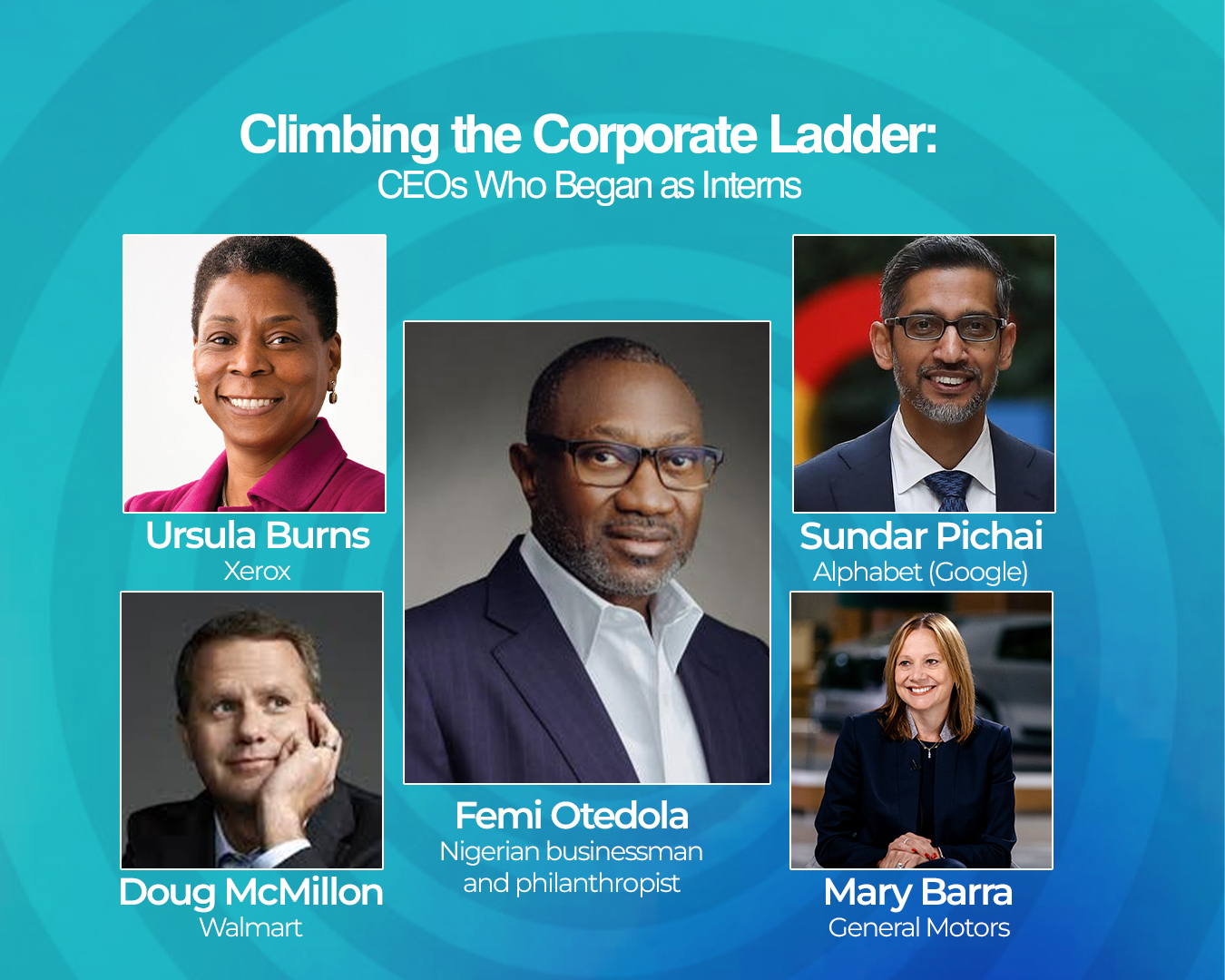Seye Joseph
The journey from the bottom rung of the corporate ladder to the corner office is often portrayed as rare, yet several global business icons embody this trajectory. Their stories show that with determination, resilience, and strategic vision, it is possible to grow from an intern or entry-level staff into the leader of some of the world’s biggest companies.
Femi Otedola
Femi Otedola began his journey at his father’s printing press in Surulere, Lagos, where he developed a love for business and machines. By 25, he was managing director but soon sought independence, working as a sales consultant on commission. In 1994, he founded Centre Force Ltd. with ₦10 million, which became the springboard for ventures in oil, gas, shipping, real estate, and finance. He later chaired Forte Oil, invested in Geregu Power Plc, and now serves as chairman of FirstHoldco Plc. From apprentice in a family press to billionaire entrepreneur, his story reflects bold ambition and resilience.
YOU CAN ALSO READ: From Printing Press to Power Plants: The Making of Femi Otedola
Sundar Pichai, Alphabet (Google)
Sundar Pichai joined Google in 2004 as a product manager, working on tools like the Google Toolbar and later playing a central role in the creation of Google Chrome. His vision and leadership quickly stood out, propelling him to senior roles and eventually to CEO of Google in 2015. He later became CEO of Alphabet, Google’s parent company.
Doug McMillon, Walmart
Doug McMillon began at Walmart as a summer associate unloading trucks in a distribution center. From there, he gained hands-on experience across various roles in the retail giant. His persistence and operational expertise led him through leadership positions until he became Walmart’s CEO in 2014, where he now oversees the world’s largest retailer.
Mary Barra, General Motors
At just 18, Mary Barra began her career at General Motors as an intern. Her technical expertise and leadership potential saw her rise steadily through engineering and management roles. In 2014, she broke barriers as the first woman to lead GM and any major global automaker, ushering in a new era of innovation and electric vehicle expansion.
Ursula Burns, Xerox
Ursula Burns started at Xerox in 1980 as a summer intern. Over the years, she worked in various roles, displaying sharp business acumen and a deep understanding of the company. In 2009, she made history as the first Black woman to lead a Fortune 500 company when she was appointed CEO of Xerox.
Ken Chenault, American Express
Ken Chenault began at American Express as an intern before moving through various leadership positions. With his strategic thinking and customer-first focus, he rose to CEO in 2001. He became one of the first African-American leaders of a Fortune 500 company and his tenure solidified American Express as a global financial services powerhouse.
Ginni Rometty, IBM
Ginni Rometty joined IBM in 1981 as a systems engineer intern. Known for her technical expertise and forward-thinking leadership, she climbed through the company ranks. In 2012, she became the first woman to serve as CEO of IBM, leading the company’s transformation into data, cloud, and artificial intelligence services.
Tim Cook, Apple
Though not an intern, Tim Cook’s career at Apple started from a modest entry-level operations role after joining in 1998. His mastery of supply chain and operations helped Apple scale globally. After years of close collaboration with Steve Jobs, he was appointed CEO in 2011, leading Apple to become the world’s most valuable company.
Indra Nooyi, PepsiCo
Indra Nooyi’s journey began as a strategy intern at PepsiCo before steadily rising through the corporate hierarchy. She became CEO in 2006 and is credited with reshaping the company’s vision around “Performance with Purpose.” Her leadership balanced profitability with social responsibility, making PepsiCo a more sustainable and innovative brand.
Ajay Banga, Mastercard
Ajay Banga began his professional journey as a management trainee before joining Mastercard. His ability to navigate financial systems and global markets saw him rise to CEO in 2010. After a decade of steering Mastercard into digital transformation and financial inclusion, he was appointed President of the World Bank in 2023.
Marillyn Hewson, Lockheed Martin
Marillyn Hewson joined Lockheed Martin as an intern in 1983. She gradually rose through the ranks in engineering, operations, and leadership roles. She eventually became Chairman, President, and CEO in 2013, strengthening Lockheed Martin’s position as one of the world’s leading defense and aerospace companies.
Phebe Novakovic, General Dynamics
Phebe Novakovic’s career at General Dynamics began with a summer internship. Her expertise in defense policy and strategic management guided her ascent within the organization. She was appointed CEO in 2013 and continues to lead one of America’s largest defense contractors.
YOU CAN ALSO READ: From Oil to Innovation: How Nigeria Plans to Build a $1 Trillion Economy
Jeffrey Immelt, General Electric
Jeffrey Immelt started at GE as an intern in 1982, gaining hands-on experience that shaped his leadership style. He became CEO in 2001, succeeding Jack Welch, and led the company for 16 years through challenging economic cycles and shifting global markets.
Anne Mulcahy, Xerox
Anne Mulcahy joined Xerox as a field sales representative and summer trainee. She rose through the ranks over two decades and in 2001, she was appointed CEO at a time when Xerox faced severe financial turmoil. She is credited with leading the company’s turnaround, paving the way for her successor, Ursula Burns.
These leaders’ journeys serve as powerful reminders that humble beginnings need not define one’s limits. Starting as interns or in entry-level positions, they climbed step by step, fueled by vision, discipline, and resilience. Today, their stories inspire a new generation of professionals who see internships not just as temporary opportunities, but as stepping stones to the top of global business.










